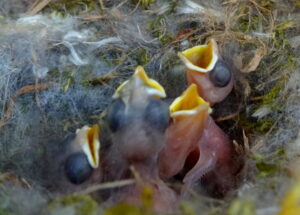 I feel the heart pull of Eros as I walk downhill to check on the baby Chickadees. I knock on the nesting box door to make sure Mama is out and open it gently. They’re gone! Can it be? They were all here yesterday. I look again. The tidy nest is empty as though the nestlings were never there. Seven tiny bodies full of yesterday’s hope may have been eaten by a House Sparrow since the predator guard keeps out snakes, cats, and raccoons, but not other birds.
I feel the heart pull of Eros as I walk downhill to check on the baby Chickadees. I knock on the nesting box door to make sure Mama is out and open it gently. They’re gone! Can it be? They were all here yesterday. I look again. The tidy nest is empty as though the nestlings were never there. Seven tiny bodies full of yesterday’s hope may have been eaten by a House Sparrow since the predator guard keeps out snakes, cats, and raccoons, but not other birds.
Watching birds through my binoculars, I witness the dance of life and death. The youthful winged god Eros fills hearts and bodies with passion for life, but the ancient god Thanatos, god of death, is always close by. I seek the passion of Eros, but instead get a message from Thanatos.
Yesterday at the Tree Swallow nesting box where the female is incubating six creamy eggs, agitated Swallows swoop through the air with frantic shrieks. Out my office window, I see a hungry House Sparrow and understand. I pull on my boots, inspect the crime scene, and the Sparrow flees. A tiny featherless pink embryonic body lies limp over the wire predator guard in the hot sun. The heart still throbs in the newborn’s chest, so I gently place it back in the nest where I see a second baby bird, probably dead. The parents are hysterical. I would be, too.
The still living newborn lifts its head, a tiny body with a wide open maw. I have nothing except a bowl of water I brought for the adults, but baby birds don’t usually drink water. Still, I see the open beak and dip my finger into the water and let one tiny drop fall into the open mouth. It swallows and calms.
Later that day, the mother leaves the box, so I inspect the nest again. One dead body lies motionless, but a tiny baby sprawls on top and opens its mouth for food. Is that the one who drank the water drop?
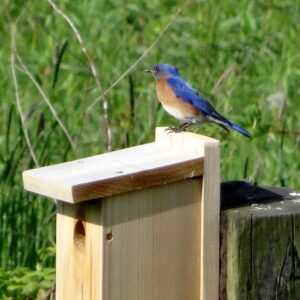 The challenge is to keep my heart open to love and joy while acknowledging the impermanence of it all. The birds remind me. Loss is always the other side of Love.
The challenge is to keep my heart open to love and joy while acknowledging the impermanence of it all. The birds remind me. Loss is always the other side of Love.
The next morning, I walk down the hill past the Chickadee box. Death came before they had a chance to grow in their fur and moss lined nest. Walking home, I see the Bluebird male devour a squirming caterpillar—a beautiful bird playing the part of Thanatos to this caterpillar who also wants to live.
As I near my home, the Tree Swallow female leaves her nest and flies in big swoops with her mate. While they’re out, I look in their box. The dead baby has been removed by the parents but the one remaining nestling, featherless and pink, opens its mouth wide, hungry for life.
***
Have you been involved with Nature’s life and death struggles to survive? This can be true of humans as well as tiny birds who teach me about their incessantly vulnerable journey. For other posts about nature’s challenges and pleasures, see The Tree Swallow’s Sacred Nest or When the Bluebirds Fledged.
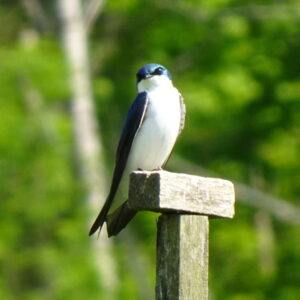
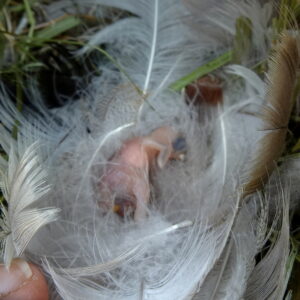
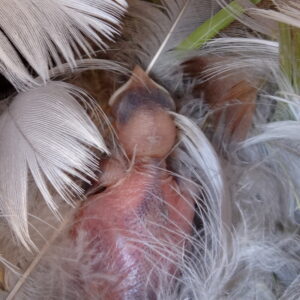
Dear Elaine,
Oh, how my heart rose and fell in equal measure! Your wonderful story and photos reminds me of the day I discovered a young magpie in my garden, one still being fed by its parents as he was unable to fly due to not having fully grown tail feathers. Apparently, fledged magpies need to be fed for a couple more weeks so stay close to the nest, only this one had fallen from the branches above and had landed in my garden.
I watched for several hours but the parents didn’t come so I dug up some worms and left water but alas, no interest was shown. The magpie, whom I named Martin, seemed to only want curl up in a ball, if such things are possible, and wouldn’t come out of himself. The next morning I found him dead under the bush where I had first spotted him. His body fed many, in the days to come, including another magpie.
And so Martin the magpie was born and for a couple of weeks he thrived and grew and his parents did everything in their power to protect him until he fell from above and was lost to them. The poet in the garden tried her best too but couldn’t make the bird eat or drink. Perhaps Martin knew he would die. Perhaps his parents knew and that’s why they never came back. Such a short life but never forgotten by the poet.
Love and light, Deborah
The baby birds I watch (bluebirds, swallows, and more) are fed by their parents for at least a few weeks after leaving the nest. They’re helpless. I can imagine how hard you tried to save little Martin. I think I only saved the Tree Swallow because I saw it out of the nest on the predator guard (probably only for a few seconds) and noticed the beating heart. I was there at the right moment to get it in the nest and out of the sun. I read later that baby birds shouldn’t be given water, but I didn’t have time to read anything in the middle of the baby’s emergency. The baby was alive and exposed. All I had to do was pick it up gently, open the nesting box door, and deposit it inside. I didn’t think it had a chance. Now I compulsively check on the little Tree Swallow Miracle Child. Are both parents there? Is Mama in the nest? Is Papa guarding and feeding?
All seems well now on its fourth day, but just to walk outside to check, I have to wear an N95 mask because of intense pollution from the Canadian forest fires. My heart breaks for the dying trees and the communities of animals who can’t escape. Sigh… Climate change isn’t messing around with warnings now. Kali is here.
Sending you love, light, peace, and rain.
How pointed and brutal even this tiny world can be! You lay it bare with compassion.
When we remodeled this old farm house, we put many windows on the “wild” side and bird feeders and nesting boxes are set up so it isn’t hard to see them from porches or windows. These nesting birds become my summer companions. My mania may be more extreme because of hearing loss (I can see them!) and because I live alone. I love being part of the cycles of nature. The air pollution is nasty today and even Disco wants to stay inside. It makes me remember India and a few other places where people experience this kind of air quality all the time. We’ve been fortunate here and I hope our good fortune returns.
Oh dear, it is fascinating and, at the same time, tragic as we observe life. You have an exciting activity in your area which might bring happiness and sometimes sadness. We also have some lodges for the birds, especially the titmice, which is needed in spring when they are active. I observe them, too and wish them blessings.
We wish blessngs to all living beings. Their vulnerability keeps me in touch with my vulnerability and how fragile each moment is. This has been a hard year for the nesting birds and also a hard year in the Canadian forests. Usually we don’t notice what’s going on in northern Canada, but this year the Wind Goddesses are making us face what’s happening on this Earth. Wishing you blessings, too, as you grieve over the violence in your country. The microcosm of the birds and the macrocosm of Iran and the rest of the world.
Your translations of the ordinary are extraordinary. Your willingness to hold the sorrow of loss, of seeing death as part of life not the end of it, is profound. Your words give strength and courage to face what must be faced.
I spent quite a while yesterday weeping for the loss of a friend who died a half year ago. Reading this today somehow softens the sorrow.
Your way of reading your environment with such attention and the ability to use it as a teaching tool is impressive.
As are your photos! Thank you.
PS We have a nest above the door on our back porch. Chuck mentions you almost every day. “I wish we had a better angle to take shots like Elaine”. We can just now after some time see the tiny heads pop up above the rim of the nest when the parents bring food. I suspect soon they will be gone too. The placement makes our life a little more difficult as we feared using the porch light would cook the eggs or hatchlings. (The nest is above a light fixture). Fortunately the few times we did put it on, we remembered quickly and it did not have an ill effect.
Thank you, Lauren. I find most of my stories on my land as I recognize more and more that since Vic’s death and as I live alone here, I’ve become more of a Nature Mystic. I’m also here year round and watch the changes in the seasons and the angle of the light. This year the streams are dry and now the sky is dirty hazy orange from air pollution from the Canadian wildfires. More lessons on how small the Earth is and interconnected and fragile we are, but the hummingbird just came for a sip of nectar on the back porch and the Tree Swallow baby is growing and thriving. I love Chuck’s comment and remember him walking around my yard to find the best views of the Bluebirds. “A good man,” I thought. Tell him I have a much better binocular now. 😉
Maybe you can construct something to stop birds from nesting on your porch light, but then one project leads to another… I love my nesting boxes although the birds have had a hard year. They have a round hole for their entryway, a predator guard for a porch, and one side opens so I can open the box for a better photo view. If I disturb the Mama bird by mistake, she can leave through the round entry. Everybody happy! Now if we could get some rain. I see the NM afternoon showers on radar and think of you.
I witness the dance of life and death with ducks and geese on our lake. Shortly after the goslings hatched in early spring, my sister noticed that of the three tiny geese, only one was learning to swim now. My sister noticed the loss first, “Something must have got the other two,” she observed.
Thank you for describing all the tiny “tots” in your animal kingdom, hungry for life. Most survive, but some don’t, the dance of nature continuing.
On another note, I observe the cycle of change with our grandchildren. As of this weekend, three of the four have graduated from high school. This fall, these three will have flown the nest, the fourth close to the brink now in tenth grade. I have a bit of angst about the whole parade of progress; their parents have more, no doubt. The beat goes on, and we continue to have to learn the impermanence of each stage of our lives.
The babies are so vulnerable, Marian. For nesting birds, it’s usually when they leave the nest, but in this case, a House Sparrow came into the nest after them. Humans brought house sparrows from Europe (England, perhaps) and they don’t have natural predators here so they’re a menace to smaller birds. I’ve never had such a problem with survival rates, but the weather is alarming with air pollution and lack of rain, so that may be part of the problem. And the human kids move on, too, we hope safely and with minimal drama. I don’t have grandchildren to fret over, so I worry about birds. I hope your weather is healthier than in the northeast.
Thank you for that poignant and moving account of your experience with impermanence and suffering in equal measure. I felt it and it’s universality.
Wishing you a big dose of equanimity. Patricia
Thank you, Patricia. I watch the surviving Tree Swallow with gratitude. Thankfully I arrived in time to save it and can now watch it grow. One parent is with the little one all the time since the other must find sparse food. (It’s been a challenging year for birds and wildlife on my land with pollution and lack of moisture. I can’t imagine the suffering of wildlife in Canadian fires.)
thank you Elaine, you make alive even as death is present. The Lord giveth and taketh. I’m also reminded of the impermanence of everything.
Your gesture with tiny drop of water fills my heart ..
Susan, that little drop of water felt like a blessing. The little Tree Swallow is growing fast and the parents are attentive. I won’t know for sure if this little one escaped injury until it flies away, probably next week. It looks healthy, so I hope it is. One survivor would be an incredible gift since the nesting birds had a hard year with drought. Bluebirds are around close to the house because I see the guarding Papa, but I can’t find the nest. I hope they have a healthy clutch. The world and my country are in alarming shape, so I’m grateful for local peace in nature, especially after last week’s orange skies from fire pollution. Have a joyful day.
Dear Elaine, As always, you have once again managed to capture such a wide range of images and emotions. I feel joy as I revel in the miracle of the Tree Swallow child, at the same time as I make room for the sorrow of what did not survive, and the knowing that it is all part of the life/death/life cycle.
This is the first year in 22 years that “our” barn swallows did not return. One can’t help but wonder if this, too, is related to climate change.
Sending pre-solstice blessings your way, Anne
Anne, today I shared photos of the little Tree Swallow leaving the nest. I found this lone surviver on June 2 and today it flew away with its parents. The parents swooped with joy. The nesting boxes have had many casualties this year, maybe because we had no rain in May, maybe because of smoke pollution, or maybe I just don’t know why other than the general label of “climate change.” One little bird brought joy here today. Summer Solstice blessings to you.